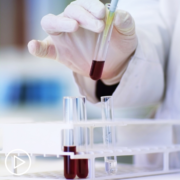Is the COVID-19 Vaccination Safe for CLL Patients in Treatment?
Is the COVID-19 Vaccination Safe for CLL Patients in Treatment? from Patient Empowerment Network on Vimeo.
Are COVID-19 vaccines safe for chronic lymphocytic leukemia (CLL) patients in treatment? Dr. Lindsey Roeker discusses COVID-19 vaccine safety, common symptoms, and the effectiveness in CLL patients.
Dr. Lyndsey Roeker is a hematologic oncologist at Memorial Sloan Kettering Cancer Center. Learn more about Dr. Roeker here.
Related Resources

What CLL Tests Are Essential and How Do Results Impact Treatment and Prognosis? |

|

|
Transcript:
Katherine:
We have another question from our audience. Eileen is currently in active treatment for her CLL, and she wants to know, “Is the COVID-19 vaccine safe for her?”
Dr. Roeker:
Great question. So, here is my take on COVID vaccines. We have great data on the safety of these vaccines, so the risk of a life-threatening allergic reaction is very, very low, less than one in a thousand. We know that it can cause some irritation at the injection site, so pain in your arm. We know that it can cause some kind of flu-like, blah symptoms for a couple of days, totally fine to take ibuprofen and kind of get yourself through that period.
But from a safety perspective, I don’t have concerns about these vaccines. There’s a lot of social media coverage on long-term implications that are either not based on data, at all, and just speculation, and people who are trying to raise alarm, or people who are really bringing up bad things that are happening to people really far out from the vaccine. And I think it’s really hard to attribute that to the vaccine. Obviously, any time there is a new technology, there’s the possibility of things happening, and we’re going to know more with time, but I think, overall, from a scientific perspective, there is no data that makes me worried about the safety of this vaccine.
The efficacy question, I think, is more of an open question, and the reason I say that is two-fold. The first is, we know that patients with CLL who get other vaccines, some get 100 percent coverage, some get zero percent coverage, and some are somewhere in between.
And it’s hard to predict who is going to fall where. So, that’s the first piece. The second piece is, we’ve looked at patients who had CLL and got COVID, and we saw if they made antibodies, which is kind of a marker of an immune response, and it’s not consistent that every patient who got COVID makes antibodies.
So, the combination of those two pieces of data makes me question exactly how well they’re going to work. So, what I’m telling my patients is, “Definitely go ahead and get it. I think it’s safe. And then pretend that you didn’t get it.” So, I know that’s hard advice to hear, but continue wearing a mask, continue social distancing, and continue to wash your hands. And then, every interaction you have is a risk-benefit discussion or decision. So, that’s different for every person, but in general, I recommend that people continue being cautious.
Once the whole population around you is vaccinated and we have less virus circulating in the community, that’s when it’s going to be substantially safer. So, definitely, I recommend that people get it, regardless of whether you are on watch and wait, getting treatment, have just finished treatment, whatever it is, but I do think there’s reason to be cautious even after getting vaccinated.
Katherine:
Are there symptoms or issues CLL patients should be looking out for, post-vaccine?
Dr. Roeker:
Not particularly, beyond what people are getting in kind of the general population. If you’re having a lot of those kind of flu-like symptoms, just talk to your provider to make sure that ibuprofen (Advil, Motrin) is safe, because if your platelets are really low, that can cause bleeding. But acetaminophen (Tylenol) is typically pretty safe and talk to your doctor about which medicines are kind of best for you to take in that situation, but no particular concerns in patients with CLL.



